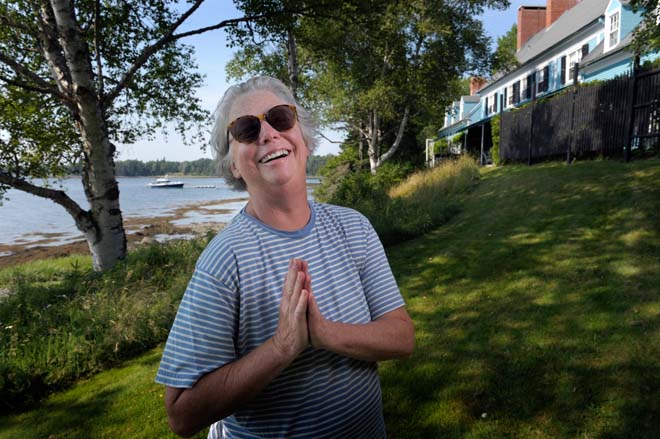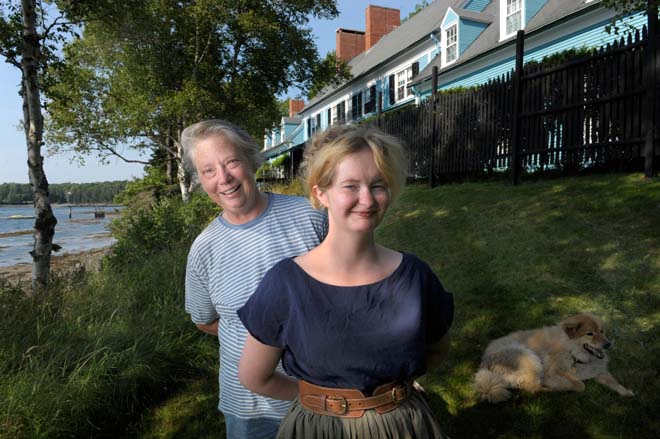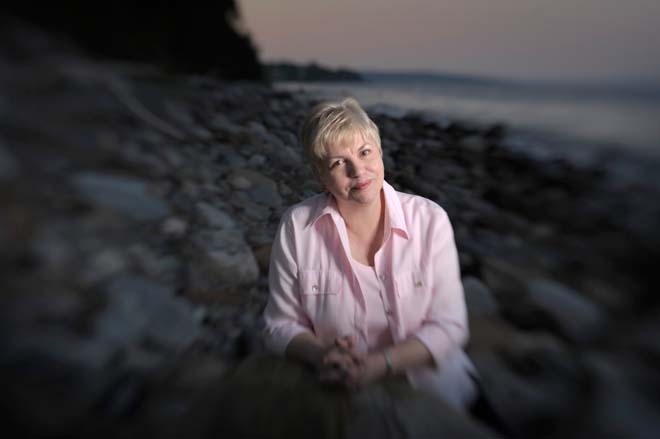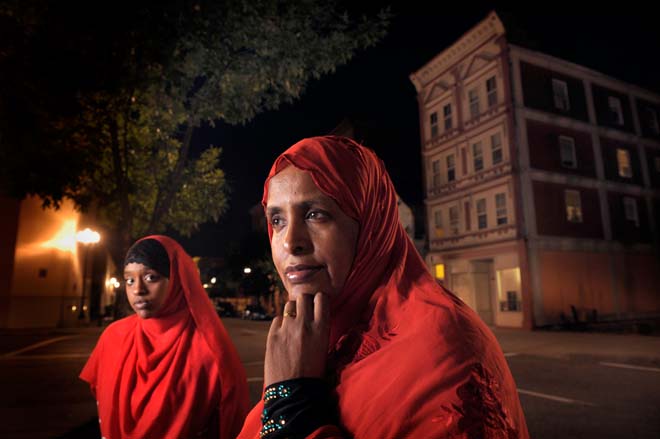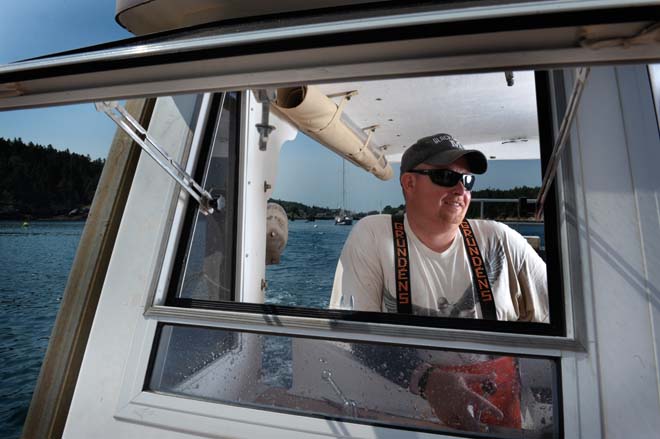The Norumbega Effect
FEATURE-September 2012
By Jaed Coffin
Photographs by Fred Field
Back when I was a kid growing up in Brunswick, the common belief among my classmates was that to be considered a “REAL MAINER” your family had to have lived in Maine for a very long time. In our soaring elementary school imaginations, a “very long time” involved images of prudish Anglo-Saxons sporting buckle shoes and bonnets, while in the background woolly mammoths stood tusk-deep in the mudflats, chomping on sea grass.
Over time, the criteria for Real Mainerhood seemed to become more exact, and yet more liberal. To be considered a Real Mainer, your family had to go back exactly six generations, as I recall. At some point, six was reduced to three.
The criteria changed again during high school. I don’t remember where this joke came from, but I heard it more than once. So there’s a pregnant woman from Maine on her way home from a Red Sox game. The baby comes early and she goes into labor. While she’s in a maternity ward in Portsmouth, the soon-to-be mother convinces her husband to sneak her back over the border into Eliot just so that the child wouldn’t have to face the embarrassment of being born “out of state.” The punch line had something to do with the placement of the woman’s feet, the direction of the baby’s head, and her husband wheeling the gurney up the steep incline of the Piscataquis River Bridge.
Then I went to college in Vermont, where some other kids from Maine and I formed a self-righteous alliance. To us, being from Maine meant we were more rugged and more independent and more honest than the rest of the student body, most of which hailed from various precincts within New England. The weird thing was that the unofficial criteria for admittance into this special club didn’t require any kind of generational or birthright proof. You only had to have gone to high school in Maine—although a public high school was best, and the further north the better.
I lived away for a bunch of years—the West Coast, overseas, in the dreaded cultural gloom that is Massachusetts—and since I’ve returned home, I’ve noticed that the defining criteria of Mainerhood have shifted again. In the media—in this magazine, for instance—I’ve noticed that the term “Mainer” is applied to people who did not grow up in Maine. In a recent profile on Portland arts maverick Andy Graham, he is identified as a “Mainer—New Jersey born and bred.”
In 2008, Tilbury House Press in Gardiner published a collection of profiles entitled New Mainers: Portraits of Our Immigrant Neighbors. On the cover is a stunning portrait of Khadija Guled, who was born in Somalia in 1979 and came to Maine in 1994 after surviving years of civil war and a series of refugee camps. Less than a decade after arriving in Maine, Guled graduated from the University of Southern Maine with a master’s degree in social work. She is now employed as a case manager at Community Counseling Center in Portland, where she helps immigrants like herself adjust to their new American lives. When I read Guled’s story, and the stories of other new Mainers, I never once considered the potential contradiction in the use of the term—probably because such distinctions seem irrelevant, if not downright petty, in the context of these remarkable stories of survival and triumph.
It’s not hard to speculate as to why we should care so much about who’s a Mainer and who’s not. Ultimately, I think most people recognize—or try not to recognize—that the only uncontestable Real Mainer claim can be made by the tribes of the original Wabanaki Nation: the Passamaquoddy, Penobscot, Mi’kmaq, Maliseet, and Abenaki. Despite epidemics of disease, warfare, colonization, and displacement, the enduring Wabanaki presence in Maine makes the modern Anglo emergence of the last two centuries look like little more than a three-day weekend.
But for the rest of us who were reared in or relocated to Maine, my sense is that, in our diffuse cultural imagination, we are haunted by two opposing but deeply related characters. One character might come to us as a guy named Uncle Skeet, who works down at the waterfront and has a white beard and wears a grungy cap and doesn’t like Massholes and who speaks up at town meetings and who embodies a murky set of good, hard-earned values. The other character takes the form of a woman named Nancy. Nancy is from New York and has a liberal arts degree and wears tennis shoes and a visor and long ago went to an idyllic summer camp on a lake in, say, the Belgrade area, and spends many evenings of her tree-less year back in the city weighing the merits of her busy urban life against the fact that it only allows her to spend a week in August in the same town where Uncle Skeet lives year round.
Every summer, Uncle Skeet sells Nancy lobsters, which Nancy cooks in a seaside cottage for her brother, an artsy type who is visiting from California and who typically spends the week taking black-and-white, documentary-style photographs of Skeet or writing beautiful essays about Skeet when Uncle Skeet’s not looking.
In this stereotyped unreality exists a huge brooding discourse on politics and class and culture and exploitation that—depending on whom you ask—may or may not be true. What I do know is this: in my mind, my sentimental Uncle Skeet nostalgia is pretty wrapped up with my fancy-thinking Nancy-like ambitions. That’s what it’s like right now in Maine, and that is how it’s always been, beginning with the first landfall of New World exploration and continuing through the fur trade, colonization, industrialization, Vacationlandization, and whatever comes next in our shared future as a state. There’s an innate tension in the condition of Mainerhood between the local, the quaint, and the pastoral, and the global, the cosmopolitan, and the complex. Our instinct is to bashfully walk away from this complexity in favor of “from away” versus “Real Mainer” simplicity.
Most of us tend to think of this tension as a recent cultural phenomenon. But it’s not. Recall the experience of Italian explorer Giovanni da Verrazano who, in 1524, had this to say about his first meeting with the local Wabanaki: “We found no courtesy in them,” Verrazano complained in his journals. “The men made all the signs of scorn and shame…such as showing their buttocks and laughing immoderately.” Returning to Italy, Verrazano referred to Maine as “the bad place.” It’s funny: as a kid, I recall acting the way same way as the Wabanaki toward traffic-jammed tourists on Route 1.
But there’s no high ground here. I know that somewhere in this Skeet-Nancy cosmology is where all the rest of us—locals and flatlanders, old timers and newcomers—hang out. We’re lost without Nancy and Skeet and everyone in between, and we’re lost without each other. But who are we? And what do have in common? And what do we call ourselves?
I’ve heard a lot of people adapt the term Mainer to suit their various needs. There’s “Mainers in Exile”—meaning, I think, people who are born here but, for whatever reason, suffer through a listless, forlorn life somewhere else. “Wannabe Mainers” live in Maine but harbor deep guilt about the fact that they grew up somewhere else. “Old School Mainers” are the guys who can get the horse out of the well. A “Maineiac” is someone who writes and performs songs about backwoods goofiness and posts them on YouTube.
But I know exactly why those of us who call ourselves Mainers feel that we deserve the title. This essential, elusive Mainer quality has to do with a sense of capital-I Independence. It’s what Senator Olympia Snowe—a Mainer whose parents were born in Sparta but gave her the glorious gift of a Maine birthright—called in a recent interview “going solo.” It’s a beautiful and direct and un-dangerous virtue, and one that we don’t have to fight over.
And yet, I’ve been thinking about our fetish for going solo lately, and, like all chest-thumping reputations, I wonder if it might not be 49 percent bogus. Maybe we actually suffer from a cultural youngest child syndrome. After all, it was not until 1820 that Maine became a state, and not because our proud forefathers stomped their feet and stood up for what we have always believed in, but because of the dicey terms of the Missouri Compromise, in which Congress granted Missouri status as a confederate slave state in exchange for the creation of Maine as its own Union state. This sounds more like a consolation prize than the proud warrior yawp of real autonomy.
Another thing we all probably have in common is something that might be referred to as the Norumbega Effect. Back in the 1500s, volleys of European explorers came back from Maine with tales of a land not only rife with fish and beaver pelts, but also overflowing with milk and honey, full of silver-adorned men and women, where the streams bubbled over gold nuggets and mystical elephant-horse creatures. Norumbega they called it. Colonists soon learned that this fabled land was rocky and stark and lonely and really, really cold. But for whatever reason, despite war and sickness and starvation and bad soil for growing crops, they didn’t leave. And that sentiment hasn’t gone away. The back-to-the-land movement of the 1960s brought another generation of in-migrants who fell victim to the Norumbega Effect. My mother, who is from tropical Thailand, did, too. Two new dads in my neighborhood are classic Norumbega Mainers—they moved here with their separate families from Europe and Los Angeles, bought a beater of a boat, and now spend their weekends camping out like pirates on the local islands. Despite the winter, and the price of heating oil, and their nighttime visions of Uncle Skeet and Nancy, they love it here, probably more than I do, and I don’t think they’ll ever leave. As the man at the post office once told me when I said I was nervous about being back home after living away for several years: “Well, if you get stuck in a rut, might as well stay there!”
Another quality that we all have in common as Mainers is that all of us—newbies, transplants, locals, and everyone else—really want to be one, and are willing to go to great lengths to insist we are. Recently, I read a column in the Portland Sun by a young guy who finally left Maine because he realized he couldn’t ever be a true Mainer. I felt bad for the kid because, with that attitude, he probably belongs here.
When I was in college, there was a kid from Maine who was a few years ahead of me. He wore cut-off flannel shirts and a fishing hat, and he talked like he had a pull of chaw in his cheek. His behavior seemed a little bit too self-conscious, and some people on campus even called him “that Maine guy.” One night, at a party, I caught up with him when he was really drunk, and he looked at me and said, “I was born in Connecticut. Didn’t move to Maine till I was eight.” The next morning when I saw him at breakfast, we could barely look at each other.
That said, I’m very proud of my Maine heritage. My morbid last name, Coffin, used to occupy over two pages in the local phonebook, and in my town it’s written on lobster pots, gravestones, schools, and street signs . Maybe that’s why I only reluctantly tell people—and only if they ask me—that I was born in Vermont and moved here when I was three. Usually, for whatever reason, they just wrongly assume that I’m part of the birthright club. And I think that’s why I consider myself, and not the rest of you posers, a Real Mainer.

